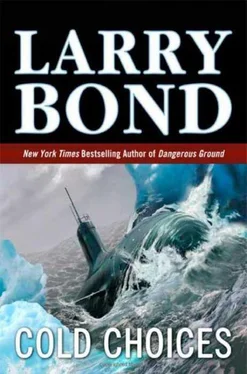“I said we’ll sort this out, and we will,” Wolfe repeated. “Now go make sure the arm can’t shift if we have to maneuver.”
While Palmer checked on the division’s progress, Wolfe said, “I was hoping you might have seen something like this on your last boat. We routinely pull it out for servicing, and the arm seems to work well. In the sea trials last week, we launched a vehicle and everything worked perfectly.”
Wolfe sighed, then asked Jerry, “Would you brief the XO? I know it’s my job, but I want to stay on top of this, and,” jerking his thumb in Palmer’s direction, “I’ve got to keep a lid on Palmer.”
“Okay.” Jerry nodded, and glanced at his watch to mark the time. “It’s been what, five minutes?”
Wolfe checked the clipboard. “Ten since we tried to re-stow the arm.”
“Yeah, it’s time to put the XO in the loop.” Jerry headed forward. He climbed the ladders between the two decks without even thinking about it, his mind trying to process the implications of a jammed recovery arm. He knocked on the XO’s door and heard, “Come.”
Lieutenant Commander Shimko was examining two forms, one in each hand, as if comparing signatures. As Jerry started to tell the XO about the problem, he methodically laid them back into a folder and placed the folder precisely on the corner of his desk.
He frowned as he heard the news, but nodded agreement when he heard Wolfe’s apology for not making the report personally. Jerry expected the XO to hurry down to the torpedo room, but instead he asked Jerry, “Is there any hazard to the boat?”
“No, sir.”
“Is there any need to change our course or depth?”
“Not at this time, sir.”
“And Mr. Wolfe and Mr. Palmer are both on task?”
“Yessir.”
“Then tell Mr. Wolfe I’ll be down there in a while. I’ll report to the Captain in the meantime. Thank you, Jerry.”
“Aye, aye, sir.”
* * *
Jerry showed up in control at 1730 hours, half an hour before his watch started. He’d eaten an early dinner, in the first sitting. Not only did his rank allow him his pick of which sitting to use, a pending watch preempted everybody except the captain. It was a good meal — stuffed pork chops. Jerry savored the salad. The fresh vegetables would disappear after two weeks.
The captain or the XO couldn’t be in control all the time, so qualified officers stood watches as “officer of the deck” or “OOD.” Responsible for the operation of the sub when the captain wasn’t there, the OOD acted in the captain’s name. Any aspect of the ship that affected its operations was his responsibility. An OOD was expected to keep the sub out of trouble, deal quickly with any casualty, and if necessary, fight the boat until battle stations were manned. If there was time, he would notify the captain of developments, but he didn’t need the captain’s permission to act.
Lieutenant Commander Stan Lavoie had stood the noon-to-six watch in control, along with two chief petty officers and five enlisted men. Other officers and enlisted men stood watch elsewhere in the boat. The sonar displays were always manned, as was engineering, with almost twelve men tending the nuclear reactor and the engines. Others took care of the auxiliary machinery, located throughout the sub. About one-quarter of Seawolf’s 130-man crew was on watch at any one time. While the working day technically ended at dinnertime, the boat never slept.
Lavoie was waiting for Jerry, and had his briefing ready. While Jerry reviewed the ship’s course, speed, depth, and other information, the enlisted men on watch each passed information on to their reliefs, and then traded places, reporting to the chief of the watch, who also briefed his relief. Although somewhat crowded with twice the number of men it normally held, control remained quiet, the men speaking in low voices.
The chief of the watch reported to Lieutenant Commander Lavoie, “Sir, the watch has been relieved.”
“Very well, Chief. Thank you.”
Lavoie turned to Jerry. “I am ready to be relieved.”
Jerry responded formally, “I relieve you sir,” then said, “This is Lieutenant Mitchell, I have the deck and the conn.” Each of the enlisted operators acknowledged Jerry’s announcement that he was now in charge.
Jerry toured each of the enlisted men’s stations — conn, sonar, fire control, the chart table, and the rest. Everything was in order, as it should be when Seawolf was simply moving from Point A to Point B.
The captain had even suspended any drills until the UUV arm was unstuck. Normally after a boat went to sea, the XO ordered a flurry of emergency drills: fires, equipment failures, flooding, a simulated radiation leak. Those drills would still happen, but not until the weapons department solved their “little problem.” In the meantime, Jerry periodically updated the heading they’d need and the time it would take to reach New London, just in case the captain asked.
The quiet and lack of change wore away at Jerry’s alertness. He’d developed and enforced a routine, checking important displays every five minutes, and every display on the half hour. He paced the limited space, and thought up questions to ask himself.
Robinson did show up with the two junior electronics technicians. Although the extra bodies crowded everyone, he was glad for the activity, and to watch some of his men at work.
Halfway through the watch, Lieutenant Wolfe appeared, grinning widely. “War’s over,” he announced, almost euphoric. “The arm moves freely and appears undamaged.”
Jerry felt several bricks fall from his shoulders. The mission could continue. “How’d you fix it?”
“All it took was a bucket of bear grease, a crowbar, and Chief Johnson cursing a blue streak.” Wolfe grinned and Jerry could see the strain falling away. He felt it himself, and he wasn’t even responsible for the retrieval arm.
“We found some debris on two of the wheels. It’s gummy, and there was some solid material in it, either grit or metal. Anyway, the chief thinks it may have been lurking, stuck to the underside of the mechanism. The division’s inspecting the entire arm now — top, bottom, and sides — for any piece of gunk big enough to see or feel.”
The XO walked into control and saw Wolfe. “I’ve briefed the Captain. He says well done, and he wants your report when you’re finished with your inspection.”
“Aye, aye,” Wolfe answered brightly.
“OOD, call away a fire drill. Make it in the auxiliary machinery room, third level.”
Jerry smiled. It was going to be a good watch.
20 September 2008
Atlantic Ocean, Lat 58°25’N, Long 035°50’W
Course 015° true, speed 16 knots
Jerry’s alarm clock went off at 0530. The recorded bird songs and the wind rustling through trees gradually grew louder, drawing him gently from his semicomatose state. He’d spent quite a bit of money on it, and it was worth every penny. Not only did it show the day and date, but it could display multiple time zones and it gave him a choice of “gentle environmental noises” designed to wake him slowly. He’d bypassed the “ocean surf” in favor of forest sounds.
Jerry spent a moment looking at the clock’s digital display, fixing the day and date in his mind; like the ship’s ordered course and speed, it helped him to orient himself. It was Saturday, the 20th of September. They’d been at sea five days. Seawolf would reach the op area in the Barents in four more days.
Jerry needed the clock. The unchanging hum of machinery gave no clue to time of day or season. On top of that was the submarine force’s unorthodox watch rotation of six hours on and twelve hours off, which threw any normal human being’s circadian rhythm into chaos. In the berthing spaces, the lights were turned to red at night, but in the control room and other working spaces, the white lights were almost always on. There were no windows, and even if there had been one, it would have showed only dark water.
Читать дальше












